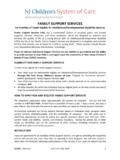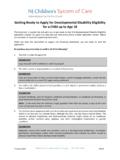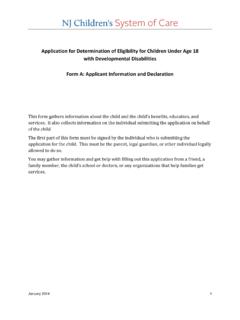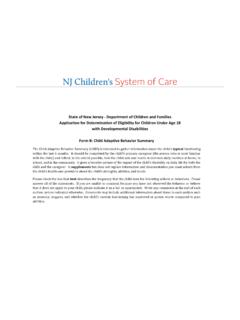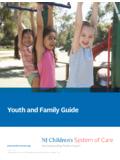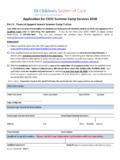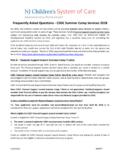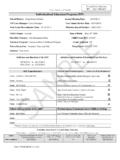Transcription of CSOC Service Guidelines Clinical Criteria INTENSIVE …
1 PerformCare 6/4/14 Page 1 csoc Service Guidelines Clinical Criteria INTENSIVE IN HOME (IIH) services FOR YOUTH WITH INTELLECTUAL AND/OR DEVELOPMENTAL DISABILITIES (I/DD) Definition INTENSIVE In-Home services means an array of rehabilitation and/or habilitation services delivered face-to-face as a defined set of interventions by clinically licensed or certified practitioners. Rehabilitation services are short term medical or remedial services designed for the restoration of a child, youth, adolescent or young adult under the age of 21, (hereafter referred to as youth), to his or her best possible functional level after an acute episode of physical or mental disability or a long term mental illness. Habilitation services are long term supports designed to assist youth with I/DD in acquiring, retaining and improving the self-help, socialization and adaptive skills necessary to function successfully in home, at school and in community based settings.
2 INTENSIVE In-Home services (IIH) are geared to augment those services already being provided in the school and other settings; they do not supplant existing services . All other benefits for which the youth may be eligible (such as SSI and private insurance) must be accessed before accessing (IIH) resources. services are not a guarantee and are based on the youth s and family s need and availability of resources. INTENSIVE In-Home services are provided in the youth s home and/or in community-based settings, and not in provider offices or office settings. Providers must be able to safely address complex needs and challenging behaviors including but not limited to: noncompliance to verbal/written directions, tantrums, elopement, property destruction, physical/verbal aggression, self-injurious behaviors, and inappropriate sexual behavior. These services are provided as part of an approved INTENSIVE individualized in-home Service plan and encompass a variety of Clinical and behavioral intervention supports and services , including, but not limited to: Clinical (Rehabilitation) Clinical and therapeutic services are to be delivered as necessary to improve the individual s independence and inclusion in their community.
3 These services are flexible, multi-purpose, in-home/community, Clinical supports for youth and their parents/caregivers/guardians. They are flexible both as to where and when they are provided based on the family s needs. The youth s treatment is based on targeted needs as identified in the treatment plan. The treatment plan includes specific intervention(s) with target dates for accomplishment of goals that focus on the restorative functioning of the participant with the intention of: Stabilizing behavior(s) that led to the crisis, Preventing/reducing the need for inpatient hospitalization, Preventing the movement of the residence, and Preventing the need for out-of-home living arrangements. PerformCare 6/4/14 Page 2 A comprehensive integrated program of services is rendered to support improved behavioral, social, educational and vocational functioning. In general, this program will provide youth and their families with services such as Clinical consultation/evaluation , Biopsychosocial Assessment and related assessments, psychoeducation, individual and family counseling, negotiation and conflict resolution skill training, effective coping skills, healthy limit-setting, stress management, self-care, budgeting, symptom/medication management, and developing or building on skills that would enhance self-fulfillment, self determination, education and potential employability.
4 The services provided will also facilitate transition from an INTENSIVE treatment setting back to his/her home. Interventions are time limited and will be delivered with the goal of diminishing the intensity of treatment over time. Clinical Interventions should include but are not limited to: Biopsychosocial Assessment, IMDS Needs assessment, this is an independent, singular Service separate from any ongoing Clinical intervention; the submission of the required documentation to the CSA is the completion of the IIH assessment Service . Development of an integrated plan of care, which includes: csoc Information Management Decision Support (IMDS) Strengths and Needs Assessment or other csoc approved/required IMDS tools; Other assessment tools as indicated; clinicians must be familiar with the array of considerations that would indicate preferred assessment methods; Individual, family and group counseling; Positive Behavioral Supports; Instruction in learning adaptive frustration tolerance and expression, which may include anger management; Instruction in stress reduction techniques; Problem solving skill development; Psycho- educational services to improve decision making skills to manage behavior and reduce risk behaviors; Social skills development; Trauma informed counseling; Implementation of an individualized Behavior Support Plan, if present.
5 Providing coordinated support with agency staff and participating as part of the Clinical team; Collaborating effectively with professionals from other disciplines that are also supporting the youth, including but not limited to: education, clinicians, physicians, etc.; and, Recommendations for referrals for medical, dental, neurological or other identified evaluations. Behavioral (Habilitation) Behavioral intervention services include a comprehensive integrated program that support improved behavioral, social, educational and vocational functioning. In general, this program will provide children, youth, adolescents, or young adults with services such as developing or building on skills that would enhance self-fulfillment, education and potential employability. The youth s treatment is based on targeted needs as identified in PerformCare 6/4/14 Page 3 the treatment plan.
6 The treatment plan includes specific intervention(s) with target dates for accomplishment of goals that focus on the amelioration of: Behaviors that may threaten the health or safety of themselves or others, Behavior disorders that may be a barrier to their ability to remain in the least restrictive setting and/or limit their ability to participate in family and community life, and Absence of developmentally appropriate adaptive, social, or functional skills. The services provided will also facilitate transition from an INTENSIVE treatment setting back to his/her home. Interventions are time limited and will be delivered with the goal of diminishing the intensity of treatment over time. Behavioral intervention services are medically necessary behavioral interventions based on the principles of applied behavior analysis and related structured behavioral programs , as prescribed through a treatment plan.
7 Behavioral intervention services are provided to make change through the diminution of maladaptive behaviors and the development of adaptive behaviors. Behaviors of focus for behavioral intervention are fully described in terms of intensity, frequency, antecedents, and desired outcome. Consequently, behavioral intervention services are the most easily evaluated for effectiveness and change. Behavioral Interventions should include but are not limited to: Development of an integrated plan of care, which includes: Applied Behavior Analysis- Functional Behavior Assessment and related assessments, , preference assessments, reinforcer assessments; Behavior Support Plan; Level of Functioning in the six major life areas, also known as Activities of Daily Living (ADL) as measured by the Vineland or other similar accepted tool; Appropriate augmentative and alternative communication supports and functional communication training, visual schedules, contingency maps, Picture Exchange Communication System (PECS), wait signal training; Instruction in Activities of Daily Living; Implementation of individualized Behavior Support Plan; Individual behavioral supports such as Positive Behavioral Supports.
8 Training/coaching for the youth/young adult to meet the individual s behavioral needs; Support and training of parent/legal guardian to successfully implement Behavior Support Plan, use of Assistive Technology, and other support services as needed, gradually diminishing the need for outside intervention; Modifying behavior support plans based on frequent, systematic evaluation of direct observational data; Providing training and supervision to support staff providing in home ABA services ; Recommendations for referrals for medical, dental, neurological, or other identified evaluations; Providing coordinated support with agency staff and participating as part of the Clinical team; Collaborating effectively with professionals from other disciplines that are also PerformCare 6/4/14 Page 4 supporting the youth, including but not limited to: education, clinicians, physicians, etc.
9 ; and, The Functional Behavior Assessment and development of a Behavior Support Plan shall be an integral part of the treatment planning process for those identified youth. INTENSIVE in home services shall not be provided in an office setting nor shall the provider require the child, youth or young adult and his or her family to meet at a site decided by the provider to receive the services . These services shall not be provided in a hospital or residential treatment center accredited by The Joint Commission (formerly the Joint Commission on Accreditation of Healthcare Organizations), the Council on Accreditation ( ), and the Commission on Accreditation of Rehabilitation Facilities ( ). They should also not supplant existing services . Qualification Requirements for all Providers: Clinical Supports Master s degree in psychology, special education, guidance and counseling, social work or a related field with at least one year of experience in providing Clinical services for individuals who have intellectual/developmental disabilities and clinically licensed to independently practice in NJ or a master s level licensed practitioner who is practicing under the supervision of a clinician who is clinically licensed to independently practice in NJ.
10 Master s degree National Association for the Dually Diagnosed, NADD certification is preferred. Behavioral Supports Applied Behavior Analysis- Functional Behavior Assessment and development of a Behavior Support Plan: Bachelor s degree in psychology, special education, guidance and counseling, social work or a related field and at least one year of supervised experience in developing and implementing behavior support plans for individuals who have intellectual/developmental disabilities. Bachelor s degree Board Certified Assistant Behavior Analyst, BCaBA is required, and, BCaBA must be under the supervision of a BCBA, or; Master s degree in psychology, special education, guidance and counseling, social work or a related field and at least one year of experience in developing and implementing behavior support plans for individuals who have intellectual/developmental disabilities.
